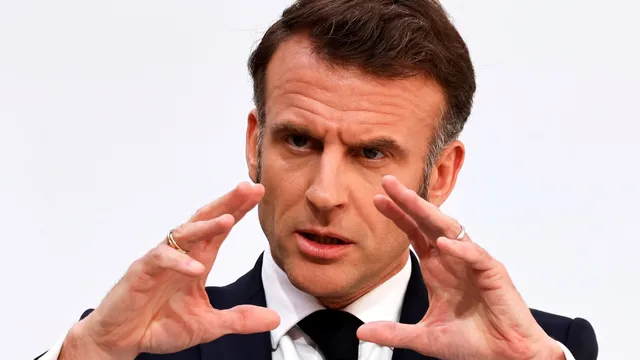
Macron pushes forward with Ukraine force despite divided European allies
2025-03-27 13:56- Macron announced plans for a military initiative to support Ukraine amidst ongoing conflict.
- European allies are divided on the proposed armed force, with only some willing to participate.
- Despite the lack of unanimous support, Macron and the UK will continue with the initiative.
Express your sentiment!
Insights
In Paris, French President Emmanuel Macron revealed plans for a military initiative aimed at providing support to Ukraine amid the ongoing conflict with Russia. During a news conference following the third summit of a coalition of European leaders, Macron addressed the complexities surrounding the proposed deployment of an armed force to back a potential peace deal. He stated that not all European allies agree with the proposal, indicating that it is not a unanimous decision. Macron emphasized that France and the UK are committed to moving forward with this initiative, even in the absence of full support from all European nations. The proposed reassurance force aims to bring together military assets from several European countries to ensure a lasting peace in the region. Macron noted that he and British Prime Minister Sir Keir Starmer are working closely with Ukrainian representatives to determine the optimal locations for this military deployment within Ukraine. This development comes as leaders from nearly 30 countries, along with NATO and EU chiefs, convened to discuss their collective stance on the conflict, which has persisted for more than three years. Macron's comments highlighted that while some nations are hesitant about contributing to the armed deployment, the initiative will proceed regardless. He maintained that achieving a peace deal does not require unanimous participation from all European allies, suggesting a willingness to adapt to the reluctant stance of certain countries. The UK Prime Minister conveyed the necessity for American involvement in this military initiative, marking the critical role the United States plays in European security and foreign policy. The geopolitical landscape is increasingly complicated as various world leaders, including Donald Trump, seek an end to the ongoing war. However, recent bilateral negotiations between the United States and Russia have produced little tangible progress. Framework agreements concerning Black Sea shipping and strikes on energy infrastructures have been established but face contentious disagreements and accusations of violations from both Ukraine and Russia. The pressure for a resolution remains high as the humanitarian toll expands and calls for strategic military efforts continue to resonate across Europe.
Contexts
The conflict in Ukraine has its roots in a complex interplay of historical, cultural, and political factors dating back several decades, but the most significant escalation occurred in 2014 when Russia annexed Crimea following Ukraine's Euromaidan protests and the subsequent ousting of President Yanukovych. This marked the beginning of a broader conflict in Eastern Ukraine, where Russian-backed separatists declared independence in the Donetsk and Luhansk regions. The situation drew sharp condemnation from Ukraine and resulted in a series of international sanctions against Russia, alongside deepening military and economic ties between Ukraine and the West. This conflict has not only impacted Ukraine's territorial integrity but has also highlighted the strategic importance of Ukraine in the context of European security and Russia's broader ambitions in the region. In response to the ongoing conflict, European allies have coordinated a multifaceted approach, which includes diplomatic efforts aimed at conflict resolution as well as imposing sanctions on Russia to deter further aggression. The European Union and NATO have played crucial roles in not only supporting Ukraine through economic aid but also enhancing military cooperation. NATO's enhanced Forward Presence in Eastern Europe is a direct response to perceived threats from Russia, with member states increasing their military readiness and conducting exercises to reassure Eastern European allies. The political landscape within Europe has also shifted, with countries like Germany and France leading efforts for a diplomatic framework while grappling with internal divisions over defense spending and strategic priorities regarding Russia. As the conflict has evolved, it has prompted a reevaluation of security policies across Europe, especially regarding energy dependence on Russian resources. The ongoing war has spurred discussions about diversifying energy sources and investing in renewable energy to decrease reliance on Russian oil and gas. This geopolitical shift is accompanied by notable public sentiment in many European nations advocating for stronger support of Ukraine, showing solidarity through demonstrations and a rise in humanitarian aid efforts. The resonance of these movements is a testament to the evolving public consciousness regarding security, humanitarian issues, and the collective European identity in light of Russian aggression. Looking towards the future, the conflict remains complex, with the potential for escalation still very much present. The continued support of European allies is vital for Ukraine's defense and recovery, particularly in terms of military supplies and economic assistance. The prospects for a diplomatic solution, while theoretically promising through various peace initiatives like the Minsk Agreements, remain fraught with challenges, as discrepancies in the commitment from involved parties hinder progress. The conflict in Ukraine serves as a pivotal moment for European security, testifying to the long-lasting implications of geopolitical conflicts and the necessary concerted response from allies in safeguarding democratic values and territorial sovereignty.